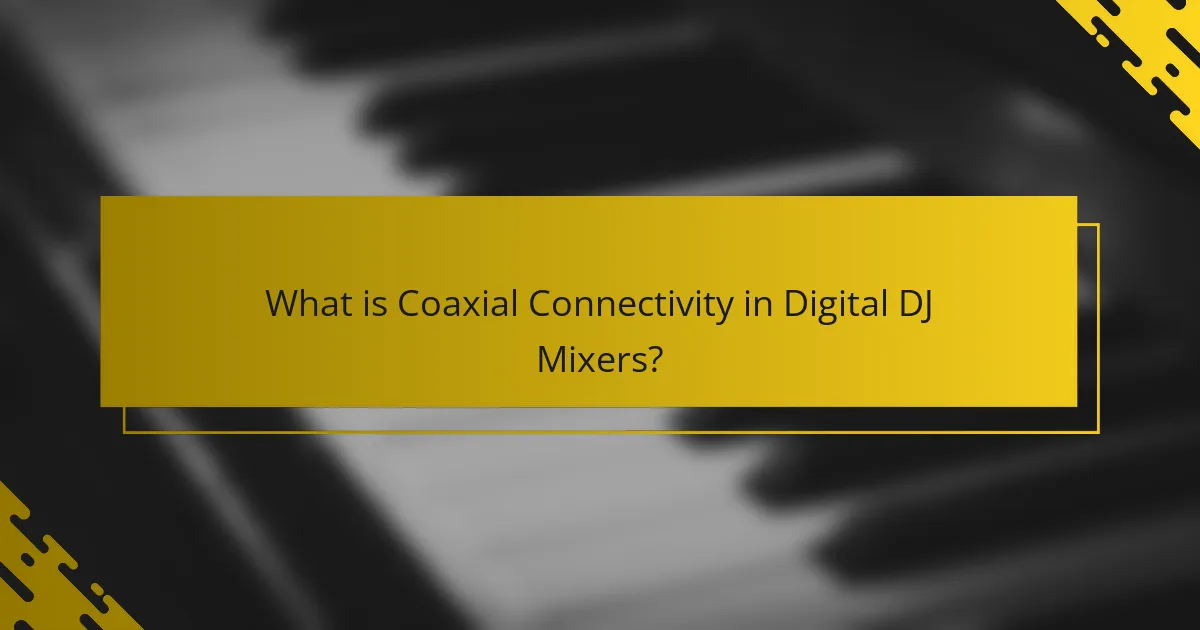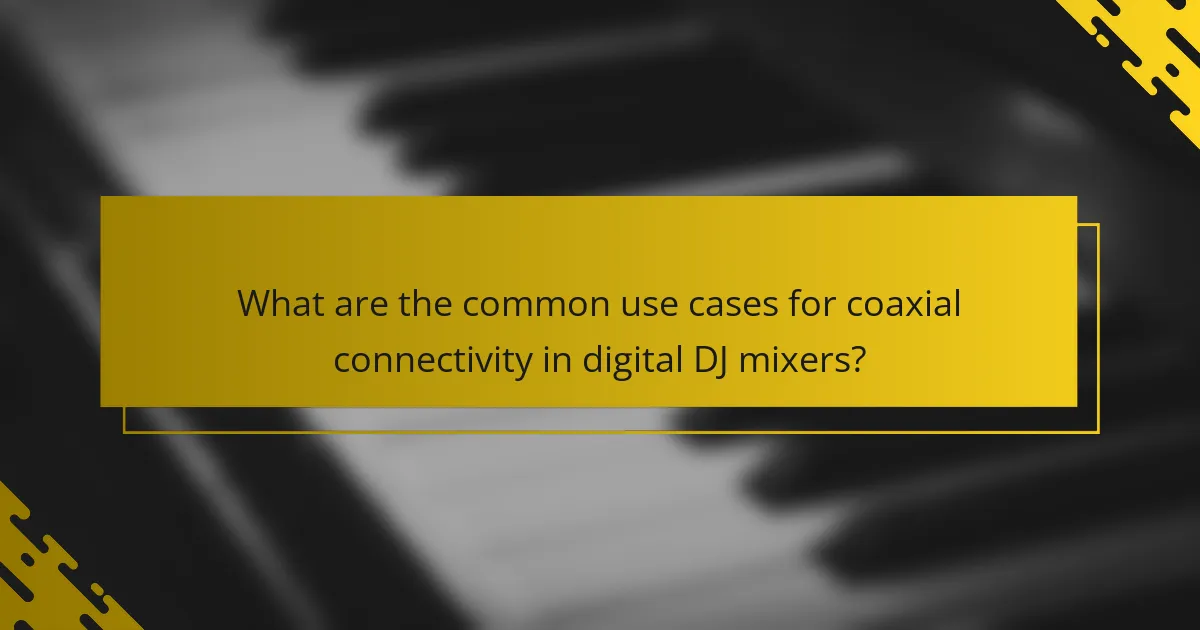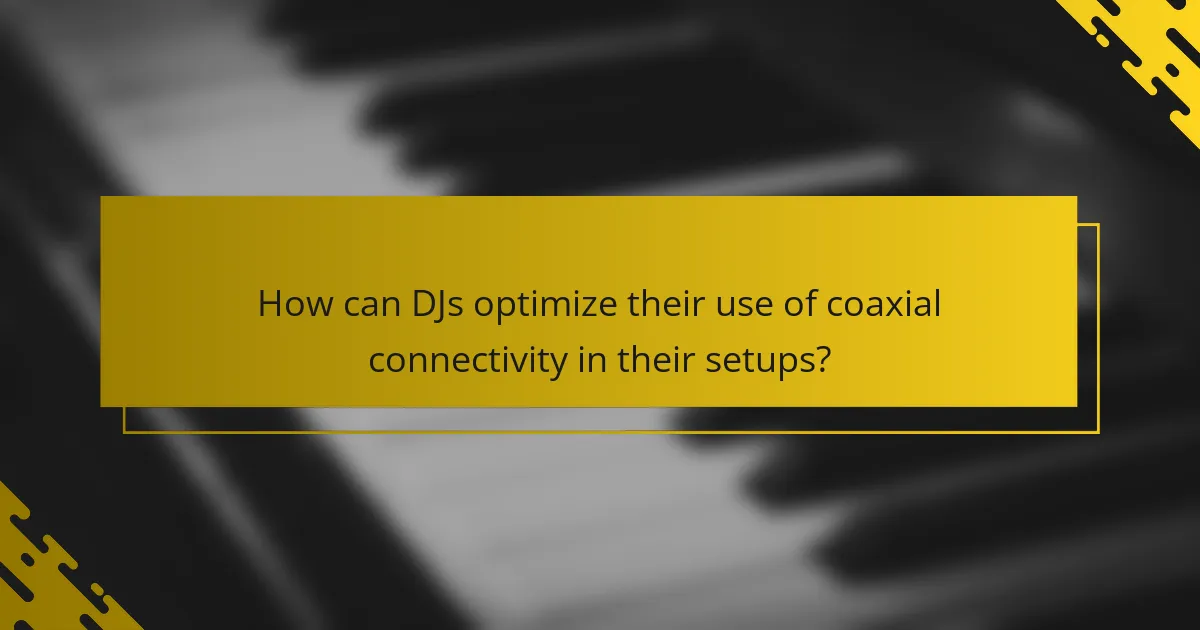Coaxial connectivity in digital DJ mixers is a specialized audio connection that employs coaxial cables to transmit digital audio signals with high fidelity and low latency. This connection type is essential for professional audio applications, as it minimizes interference and signal degradation. The article explores the benefits of coaxial connectivity, including its role in ensuring clear sound reproduction and facilitating the integration of various digital audio sources such as CD players and computers. Additionally, it highlights best practices for DJs to optimize their use of coaxial connections, including cable quality, management, and compatibility checks, ultimately enhancing audio fidelity in both live performances and studio settings.

What is Coaxial Connectivity in Digital DJ Mixers?
Coaxial connectivity in digital DJ mixers refers to a type of audio connection that utilizes coaxial cables. This connection type transmits digital audio signals, ensuring high fidelity and low latency. Coaxial cables carry electrical signals through a single conductor, surrounded by insulation and a shielding layer. This design minimizes interference and signal degradation, making it ideal for professional audio applications. Many digital DJ mixers include coaxial inputs and outputs to connect with other audio equipment, such as speakers and processors. The use of coaxial connectivity enhances audio quality by preserving the integrity of the digital signal during transmission.
How does coaxial connectivity function within digital DJ mixers?
Coaxial connectivity in digital DJ mixers allows for the transmission of digital audio signals. It uses a single cable to carry both the signal and the ground, minimizing interference. This type of connection is often found in professional audio equipment, ensuring high-quality sound. Coaxial cables are designed to handle high-frequency signals without degradation. They provide a reliable connection between mixers and other audio devices, such as speakers or digital audio interfaces. The use of coaxial connectivity enhances sound clarity and reduces latency. Many digital DJ mixers feature coaxial inputs and outputs for seamless integration with various audio systems. This functionality is crucial for live performances where sound quality is paramount.
What are the key components of coaxial connectivity?
The key components of coaxial connectivity include the coaxial cable, connectors, and signal transmission. Coaxial cables consist of a central conductor, insulating layer, a metallic shield, and an outer jacket. The central conductor carries the electrical signal. The insulating layer prevents signal interference. The metallic shield protects against external electromagnetic interference. Connectors, typically RCA or BNC types, facilitate the connection between devices. Signal transmission occurs in a controlled impedance environment, usually 75 ohms for video applications. This design minimizes signal loss and maintains integrity over distances.
How do these components interact in a digital DJ mixer?
In a digital DJ mixer, components like audio interfaces, effects processors, and control surfaces interact to create a seamless mixing experience. The audio interface converts analog signals to digital format and vice versa. This allows for clear sound transmission between different audio sources. Effects processors apply sound effects in real-time, enhancing audio quality and creativity. Control surfaces provide tactile control over mixing parameters, enabling DJs to manipulate sound intuitively. These components work together through digital protocols, ensuring low latency and high fidelity. This interaction is essential for live performances, where timing and sound quality are critical.
What are the advantages of using coaxial connectivity in digital DJ mixers?
Coaxial connectivity in digital DJ mixers provides several advantages. It offers superior sound quality due to its ability to transmit digital audio signals without degradation. This type of connection minimizes interference from external sources, ensuring a clean audio output. Coaxial cables are also widely available and cost-effective, making them accessible for DJs. Furthermore, coaxial connections support higher bandwidth, allowing for transmission of high-resolution audio. This capability enhances the overall performance of digital DJ mixers. Additionally, coaxial connectivity is compatible with various audio equipment, providing flexibility in setup. These factors collectively contribute to the preference for coaxial connectivity in professional audio environments.
How does coaxial connectivity enhance audio quality?
Coaxial connectivity enhances audio quality by providing a high-bandwidth digital connection. This type of connection transmits audio signals in a single cable, minimizing signal degradation. Coaxial cables are less susceptible to electromagnetic interference compared to analog connections. The digital signal remains intact over longer distances, ensuring clarity and fidelity. Additionally, coaxial connections support higher sample rates and bit depths, which improves overall sound quality. This is particularly beneficial in professional audio environments, such as digital DJ mixers. The use of coaxial connectivity allows for a cleaner, more accurate audio reproduction, essential for high-quality performances.
What are the cost benefits associated with coaxial connectivity?
Coaxial connectivity offers significant cost benefits due to its efficiency and reliability. It requires less expensive cabling compared to optical or fiber alternatives. Coaxial cables also support longer distances without signal degradation, reducing the need for additional equipment. This minimizes installation and maintenance costs over time. Furthermore, coaxial systems are often compatible with existing infrastructure, which can lower upgrade expenses. Overall, these factors contribute to a more economical solution for audio transmission in digital DJ mixers.

What are the common use cases for coaxial connectivity in digital DJ mixers?
Coaxial connectivity in digital DJ mixers is commonly used for transmitting high-quality audio signals. This type of connection allows for low-loss digital audio transfer. DJs use coaxial connections to link mixers with external devices like digital audio converters. It is also utilized for connecting to sound systems, ensuring clear sound reproduction. Additionally, coaxial connections facilitate the integration of various digital audio sources. This includes connecting CD players and computers to the mixer. The reliability of coaxial connections reduces the risk of signal interference. Overall, coaxial connectivity enhances audio fidelity in live performances and studio settings.
In what scenarios is coaxial connectivity preferred over other types?
Coaxial connectivity is preferred in scenarios requiring high bandwidth and minimal signal loss. This type of connection excels in transmitting digital audio signals over long distances. Coaxial cables are less susceptible to electromagnetic interference compared to other types, like RCA or optical cables. They provide a reliable connection for professional audio equipment, ensuring high-quality sound reproduction. Additionally, coaxial connections are often used in home theater systems for their ability to carry multi-channel audio. This makes them suitable for setups where sound quality is paramount. Overall, coaxial connectivity is favored in environments demanding stable and high-fidelity audio performance.
How do professional DJs utilize coaxial connectivity in their setups?
Professional DJs utilize coaxial connectivity to ensure high-quality audio transmission between devices. Coaxial cables provide a digital signal that reduces interference. This results in clearer sound reproduction during performances. DJs connect mixers, sound processors, and speakers using coaxial connections. The digital format maintains audio integrity over longer distances. Coaxial connectivity is often preferred for its reliability in live settings. Many digital DJ mixers feature coaxial outputs for seamless integration. This setup enhances overall sound quality and performance consistency.
What types of events benefit from coaxial connectivity in DJ mixing?
Events that benefit from coaxial connectivity in DJ mixing include concerts, festivals, and club nights. These events require high-quality audio transmission. Coaxial connections provide superior sound fidelity compared to other types of connections. They reduce interference and signal degradation over long distances. This is crucial for large venues where audio clarity is essential. Additionally, corporate events and weddings also benefit from reliable audio connections. Coaxial cables support digital audio formats, enhancing overall sound quality. Thus, any event prioritizing audio excellence can leverage coaxial connectivity effectively.
What are some examples of digital DJ mixers that feature coaxial connectivity?
Pioneer DJ DJM-900NXS2 and Allen & Heath Xone:92 are examples of digital DJ mixers that feature coaxial connectivity. The Pioneer DJ DJM-900NXS2 includes digital inputs for coaxial connections. It supports high-resolution audio formats. The Allen & Heath Xone:92 also offers coaxial inputs for digital audio sources. Both mixers are widely used in professional DJ settings. They enable seamless integration with digital audio equipment. These mixers enhance audio quality and connectivity options for DJs.
What brands are known for their coaxial connectivity capabilities?
Brands known for their coaxial connectivity capabilities include Yamaha, Pioneer, and Denon. Yamaha offers a range of products with robust coaxial connections. Pioneer is recognized for its high-quality mixers featuring coaxial inputs. Denon also provides reliable coaxial connectivity in its audio equipment. These brands are prominent in the digital DJ mixer market. Each brand integrates coaxial connectivity to enhance audio quality and performance.
How do different models vary in their coaxial connectivity features?
Different models of digital DJ mixers vary in their coaxial connectivity features primarily in the number of coaxial inputs and outputs they support. Some models may offer a single coaxial input, while others provide multiple inputs and outputs for enhanced connectivity options. The signal quality and sampling rates can also differ, with higher-end models typically supporting higher sampling rates for better audio fidelity. Additionally, the presence of features like digital-to-analog converters can vary, impacting the overall sound quality. For instance, mixers from brands like Pioneer and Allen & Heath often include superior coaxial connectivity options compared to entry-level models.

How can DJs optimize their use of coaxial connectivity in their setups?
DJs can optimize their use of coaxial connectivity by ensuring high-quality cables are used. Quality cables reduce signal loss and interference. They should also maintain proper cable management to avoid tangling and damage. Using coaxial connections for digital audio ensures minimal latency. DJs can benefit from connecting compatible devices to maximize audio fidelity. Regularly checking connections for wear can prevent audio dropouts. Utilizing coaxial for stereo and multi-channel setups enhances sound clarity. Additionally, DJs should familiarize themselves with the technical specifications of their equipment to ensure compatibility.
What best practices should DJs follow when using coaxial connections?
DJs should ensure proper cable management when using coaxial connections. This prevents signal interference and damage to cables. They must also use high-quality coaxial cables to maintain sound integrity. Connecting cables securely is crucial to avoid signal loss. DJs should regularly check connections for wear and tear. It’s important to keep coaxial connections away from power sources to reduce noise. Testing equipment before performances helps identify potential issues. Lastly, using appropriate adapters can ensure compatibility with different gear.
How can DJs troubleshoot common issues with coaxial connectivity?
DJs can troubleshoot common issues with coaxial connectivity by checking cable connections first. Ensure that all coaxial cables are securely plugged into the correct ports. Next, inspect the cables for any visible damage or wear. Damaged cables can cause signal loss or distortion.
Additionally, verify that the audio source and mixer settings are correctly configured. Incorrect settings may lead to no audio output. If problems persist, test the setup with a different coaxial cable to rule out cable issues.
Lastly, restart the audio equipment to reset any temporary glitches. These steps are effective in resolving common coaxial connectivity issues.
What maintenance tips are essential for ensuring optimal coaxial performance?
Regularly inspect coaxial cables for physical damage. Look for cuts, kinks, or frays. Replace any damaged cables immediately to prevent signal loss. Keep connectors clean and free from dust or corrosion. Use isopropyl alcohol and a lint-free cloth for cleaning. Ensure connections are tight to avoid signal degradation. Avoid bending cables sharply to maintain integrity. Store cables properly when not in use to prevent wear. Following these practices ensures optimal coaxial performance.
What resources are available for learning more about coaxial connectivity in digital DJ mixers?
Resources for learning about coaxial connectivity in digital DJ mixers include online tutorials, manufacturer manuals, and industry forums. Websites like DJ TechTools and Digital DJ Tips offer articles and videos on this topic. YouTube hosts numerous instructional videos demonstrating coaxial connections in various mixers. Additionally, audio engineering textbooks often cover digital connectivity standards, including coaxial. User manuals from brands like Pioneer and Denon provide specific details on their mixers’ coaxial capabilities. Engaging in community forums such as Gearslutz can also provide real-world insights and troubleshooting tips.
Coaxial connectivity in digital DJ mixers is a crucial audio connection type that utilizes coaxial cables to transmit digital audio signals with high fidelity and low latency. This article covers the functionality, key components, and advantages of coaxial connectivity, highlighting its role in enhancing audio quality and reliability during live performances. Additionally, it explores common use cases, preferred scenarios for coaxial connections, and specific DJ mixer models that feature this technology. The article also provides best practices for DJs to optimize their setups and troubleshoot common issues, ensuring optimal performance in various audio environments.
